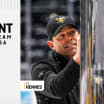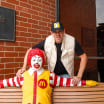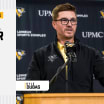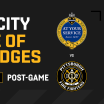Pens captain Sidney Crosby suffered a concussion after getting tangled up in practice last Friday. There are already some encouraging signs of his progress as he was able to join his teammates at Wednesday's practice for flow drills and non-contact drills.
Inside Scoop: Crosby's Concussion
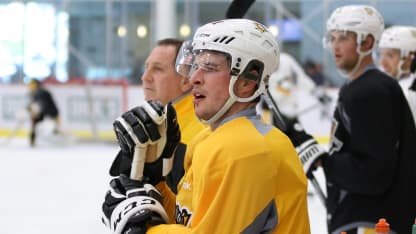
I covered Crosby's two-years long recovery from concussion and neck injuries during the 2010-12 seasons. And some perspective is good in situations like this. There are a lot of things to keep in mind as he continues to recover.
HEALTH COMES FIRST
Hockey players are first and foremost people. The policy of the Pens organization is that the health of the player will always come first in regard to any injury or situation, whether that's Sidney Crosby or any other player.
"We take all of the concussions that our players are afflicted with seriously," head coach Mike Sullivan said. "Our medical staff follows strict guidelines. There is a certain protocol. That's how our team operates. We always have our players' best interests and health as the priority. Regardless of who the player is that's how we feel."
RECOVERS AT YOUR OWN PACE
Concussions are different from every other injury in sports. If a player breaks a bone, the bone, muscle and tissue require a certain amount of recovery time. You know you have, for example, a 4-6 week range. Or if a player undergoes surgery, doctors have a timeline that can be followed and monitored.
However, concussions have no such timelines. Every single concussion is different. Every player reacts to them differently. Every concussion has different recovery times.
"I'm just trying to get better with each day. That's all you can ask for," Crosby said. "Sometimes it doesn't happen. Sometimes it stalls a bit. Everybody is different.
"Maybe it takes longer, maybe it doesn't. You're just looking for progress. That's the main thing."
PATIENCE IS KEY
More so than any other injury, remaining patient during a concussion is the most difficult aspect.
Anyone that has recovered from a concussion will tell you that there are good days and bad days. And it's easy to get frustrated. However, that frustration won't help you recover sooner.
So it's very important for a player to remain patient as he progresses through the various protocol and stages of recovery.
"I've been through this before. I don't get caught up in every little step," Crosby said. "You understand that you have to be patient. You have to listen to your body. If you're ready, you're ready. If not then you don't take any chances."
The worst possible outcome in a concussion would be returning too soon. In that case, you could set back your own recovery.
"You give yourself a lot better chance of not having it happen again if you treat it the right way. It's something you have to be smart with," Crosby said. "You don't get too high with a little bit of progress.
"I won't get caught up in too much. You just approach it with a day-to-day mentality and make sure you're improving. That's the biggest thing."
STEPS TO RETURNING
As with all injuries, there is a particular protocol for players to go through as they return from a concussion.
"You just try to find that range where you're stressing your body and testing it, but not putting it in a position where you won't feel good," Crosby said. "It's a fine line. I'm just trying to make sure I progress."
Crosby skated prior to team practice on Tuesday. He skated on his own and then joined his teammates for non-contact practice on Wednesday. Each step is being closely monitored by the Pens' medical team.
"There's a protocol that's mandated that these guys follow. Part of it is heightening their heart rates to a certain level," Sullivan said. "As they make progress you add the intensity of their workouts. You see how they respond. As players respond the right way, you take it to the next level. That's the process that we've gone through here with 'Sid' to this point. We'll continue to do that."
Since the injury isn't a broken bone that the doctors can see, they rely on Crosby's account of how he is feeling. With each level, Crosby and the medical staff are in continuous dialogue throughout the entire process.
"You listen to your body and see how things go," Crosby said. "Trainers will touch base and make sure everything is good. It's a constant thing. There isn't a specific timeline. It's more of a constant communication. You just go from there and see how you are the following day."
BOTTOM LINE
Crosby knows better than anyone about recovering from a concussion. He dealt with a two-years long recovery from concussion and neck injuries during the 2010-12 seasons, and has been healthy from that time until this current situation.
Crosby believes that he is going to be OK for not only this season, but in the long term.
"(Concussions) happen in a lot of different sports and guys have multiple concussions and are fine," Crosby said. "I think that you just have to treat them the right way and that you handle it right, and that you're honest.
"I'm comfortable and confident that things will be OK."




